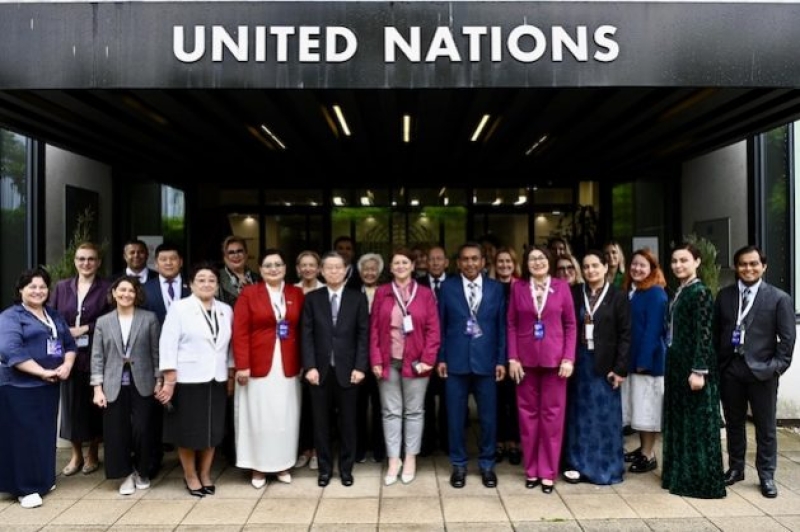- Hadi is no more, state mourning on Saturday: CA |
- Bangladesh capital market falls; weekly turnover lowest |
- Sharif Osman Hadi No More |
- Tarique Rahman to Return Home With Daughter on Dec 25 |
- ILO praises Bangladesh’s labour reforms, new milestones |
Lawmakers Push to Boost Women's Role in Politics, Workforce

MPs and delegates participate in the Study Tour on Gender Equality and Women’s Empowerment held in Sarajevo, May 29–30. Credit: AFPPD
In Sarajevo, parliamentarians from across Eastern Europe gathered for a landmark Study Tour on Gender Equality and Women’s Empowerment in Bosnia and Herzegovina. Organised by the Asian Forum of Parliamentarians on Population and Development (AFPPD) and supported by UNFPA, the May 29–30 event offered a platform for exchanging ideas, fostering collaboration, and spotlighting regional challenges and successes related to gender equality.
Strengthening Political Will for Gender Equality
Jelena Pekić, a Member of the Federation of Bosnia and Herzegovina’s House of People and Deputy Speaker of the Canton Sarajevo Assembly, emphasised the importance of direct engagement during the tour.
“This was an opportunity for MPs to meet key stakeholders from various levels of government—from state to municipal—as well as agencies, the media, and civil society. These interactions help us better understand the real-world challenges women face and the gaps between legislation and implementation,” she said.
Lana Prlić, MP in the House of Representatives of the Federation of Bosnia and Herzegovina, added that Bosnia and Herzegovina has taken important steps, such as increasing the mandatory quota for women on candidate lists to 40 percent under the 2013 Election Law. However, deep-seated gender norms and societal attitudes remain obstacles.
“One major concern is violence against women in politics,” she noted. “A study by the Westminster Foundation for Democracy highlighted how emotional and verbal abuse discourage many women from entering politics—or push them to leave.”
Legislation Isn’t Enough Without Budget Support
Marina Riđić, Assistant Representative for UNFPA Bosnia and Herzegovina, echoed this sentiment, stressing that political will must be backed by financial commitments.
“Bosnia and Herzegovina has progressive legal frameworks like the Gender Equality Law and election gender quotas, but implementation remains inconsistent,” she said. “The gap between policy and practice persists, largely due to entrenched gender roles and a lack of gender-responsive budgeting.”
She added that more than half a million women are outside the labour market in Bosnia and Herzegovina, a significant figure for a country of just over three million. “That’s a tremendous loss of economic potential.”
According to Riđić, gender equality cannot be achieved without affordable childcare, accessible health services, and inclusive education. These require dedicated budget lines and coordinated efforts across public and private sectors.
Translating Policy into Action
Pekić explained how policymakers in Sarajevo Canton are already addressing these challenges.
“We’ve prioritised programmes that support families—such as subsidies for kindergartens, extended school stays, and maternity allowances for 12-month leave. These initiatives are financially demanding, but with careful planning and clear priorities, they are feasible.”
She added that when she proposes legislation, she consults not only with other MPs but also with the executive branch and relevant NGOs to ensure that proposed solutions are practical and fundable.
Creating Pathways for Young Women
Both MPs and UNFPA representatives highlighted the importance of empowering the next generation of women leaders.
“We have government-funded programmes for women’s employment, co-financing for startups, and targeted support for women leaving safe houses after experiencing violence,” said Pekić. “But NGOs also play a key role—offering mentorships and leadership programmes for aspiring young women.”
Riđić added that UNFPA’s approach starts well before women enter the workforce or run for office. “True empowerment begins with inclusive education, community belonging, and access to healthcare,” she said.
UNFPA supports digital tools and platforms that elevate young voices, encourage civic engagement, and build leadership skills from a young age. Programmes also address rural outreach, HPV vaccination, and education on health and rights—particularly for marginalised communities, including Roma women and women with disabilities.
“These aren’t always labelled as job programmes, but they are the building blocks of participation,” Riđić stressed. “Without dignity, inclusion, and safety, sustained engagement in public life is impossible.”
Tackling Gender-Based Violence
Prlić said Parliament is beginning to act more forcefully on gender-based violence.
“We recently adopted a set of amendments strengthening protections for survivors and expanding support systems,” she said. “It’s still early, but these changes could reshape how violence against women is addressed—legally and socially.”
UNFPA, meanwhile, is working with policymakers to introduce preventive measures and survivor-focused services, advocating for a multi-sectoral approach that includes justice, health, and social services.
A Regional Call to Action
The Sarajevo Study Tour, according to all participants, was more than a learning opportunity—it was a reminder of the shared responsibility to advance gender equality across Eastern Europe and Central Asia.
“Parliamentarians are uniquely positioned to turn legal texts into lived realities,” said Riđić. “Their leadership is critical to creating the budgetary, institutional, and social change we need.”
As delegates walked the streets of Sarajevo, visited institutions, and engaged in dialogue, one message resonated clearly: the path to women’s empowerment is long, but regional solidarity and persistent political will are the keys to meaningful and lasting progress.

